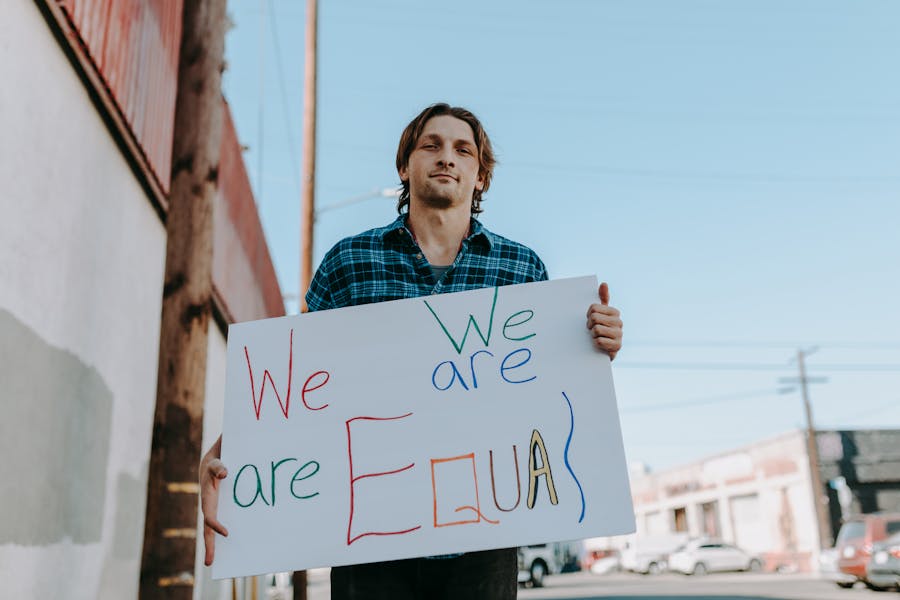Maya Angelou, an iconic figure in American history, played a pivotal role in the Civil Rights Movement. Her contributions extended beyond her literary genius; she was a passionate activist who used her voice and pen to fight for equality and justice. Through her powerful autobiographies, poetry, and speeches, Angelou inspired millions and left an indelible mark on the movement. Her journey from a young girl who experienced racial discrimination and trauma to a celebrated poet and activist embodies resilience and courage. This article delves into the various ways Maya Angelou contributed to the Civil Rights Movement, highlighting her significant actions and the lasting impact of her work.
What Did Maya Angelou Do For Civil Rights?
Maya Angelou significantly contributed to the Civil Rights Movement through her activism, literature, and public speaking. She worked closely with leaders like Martin Luther King Jr. and Malcolm X, using her talent to advocate for social justice. Angelou’s writings, including “I Know Why the Caged Bird Sings,” highlighted racial injustices and inspired change. Her powerful speeches and performances brought attention to the plight of African Americans, making her a crucial figure in the fight for civil rights.
Maya Angelou’s Early Life And Initial Involvement In Civil Rights
Maya Angelou’s early experiences with racial discrimination and trauma shaped her perspective and fueled her desire to fight for justice. Born in St. Louis, Missouri, in 1928, Angelou faced the harsh realities of segregation and racism from a young age. These experiences, though painful, instilled in her a profound sense of resilience and determination.
Angelou’s first significant involvement in the Civil Rights Movement began in the 1950s when she joined the Harlem Writers Guild. This organization aimed to support African American writers and provide them with a platform to express their voices. Through this guild, Angelou honed her writing skills and connected with other activists who shared her passion for equality.
In the 1960s, Angelou’s activism took a more direct approach. She became a coordinator for the Southern Christian Leadership Conference (SCLC), working closely with Dr. Martin Luther King Jr. Her role involved organizing events, raising funds, and mobilizing supporters for the cause. This position not only allowed her to contribute to the movement but also provided her with a deeper understanding of the struggles and strategies involved in the fight for civil rights.
Throughout this period, Angelou continued to use her literary talents to advocate for change. Her first autobiography, “I Know Why the Caged Bird Sings,” published in 1969, brought widespread attention to the issues of racism and sexual abuse. The book’s raw and honest portrayal of her experiences resonated with readers and emphasized the need for societal change. Angelou’s ability to articulate the struggles of African Americans through her writing made her a powerful voice in the movement.
Angelou’s early involvement in the Civil Rights Movement laid the foundation for her lifelong commitment to activism. Her personal experiences and connections with influential leaders allowed her to make significant contributions to the fight for equality. As we explore further, we will see how her literary works and public speaking continued to inspire and drive the movement forward.
Literary Contributions And Their Impact
I Know Why the Caged Bird Sings” and Its Influence
Maya Angelou’s autobiography, “I Know Why the Caged Bird Sings,” is one of her most significant literary contributions. This work not only brought her literary acclaim but also highlighted the struggles of African Americans, particularly women. The book’s candid exploration of racism, sexual abuse, and personal resilience resonated with readers worldwide, bringing attention to the systemic injustices faced by African Americans.
Poetry as a Medium for Social Change
Angelou’s poetry also played a crucial role in the Civil Rights Movement. Her poems, such as “Still I Rise” and “Phenomenal Woman,” celebrated the strength and resilience of black women. These works became rallying cries for the movement, inspiring individuals to stand up against oppression and fight for their rights. Her ability to convey powerful messages through poetry made her an influential figure in the literary world and the Civil Rights Movement.
Angelou’s Plays and Screenwriting
In addition to her autobiographies and poetry, Angelou wrote plays and screenplays that addressed social issues. Her play “The Blacks: A Clown Show,” co-written with Jean Genet, explored themes of racial identity and liberation. Through her work in theater and film, Angelou continued to challenge societal norms and advocate for civil rights.
Public Speaking and Advocacy
Angelou’s impact extended beyond her written work. She was a compelling public speaker, known for her eloquence and passion. Her speeches at civil rights rallies and events energized audiences and inspired action. Angelou’s ability to articulate the struggles and aspirations of African Americans made her a powerful advocate for the movement.
Activism And Collaboration With Civil Rights Leaders
Maya Angelou’s activism was deeply intertwined with her collaborations with prominent civil rights leaders. One of her most significant contributions was her work with Dr. Martin Luther King Jr. As a coordinator for the Southern Christian Leadership Conference (SCLC), Angelou played a crucial role in organizing events, mobilizing supporters, and raising funds. Her efforts were instrumental in the success of numerous civil rights campaigns, and her close working relationship with Dr. King solidified her position as a key figure in the movement. The tragic assassination of Dr. King on her birthday in 1968 deeply affected Angelou, but it also strengthened her resolve to continue fighting for justice.
In addition to her work with Dr. King, Angelou also collaborated with Malcolm X, another influential leader in the Civil Rights Movement. In the early 1960s, she helped Malcolm X establish the Organization of Afro-American Unity (OAAU), which aimed to promote black cultural identity and self-reliance. Angelou’s involvement with the OAAU showcased her commitment to the broader goals of the civil rights struggle, and her work with Malcolm X further emphasized her dedication to empowering African Americans. Despite the challenges and risks involved, Angelou’s partnership with Malcolm X demonstrated her unwavering support for radical change and equality.
Angelou’s activism extended beyond the borders of the United States. In the early 1960s, she lived in Ghana, where she worked with several African leaders advocating for independence and civil rights. This international perspective enriched her understanding of the global fight against oppression and injustice. Her time in Africa also allowed her to draw parallels between the struggles of African nations and the African American experience, reinforcing the interconnectedness of the global civil rights movement. Angelou’s international activism highlighted her belief in universal human rights and the need for solidarity among oppressed peoples worldwide.
Through her collaborations with these prominent civil rights leaders, Angelou made significant contributions to the movement both in the United States and abroad. Her work with Dr. Martin Luther King Jr. and Malcolm X showcased her ability to bridge different approaches to activism, while her international efforts underscored the global nature of the fight for equality. Angelou’s activism was characterized by her resilience, determination, and a profound sense of justice, making her an enduring symbol of the Civil Rights Movement.
The Legacy Of Maya Angelou’s Civil Rights Work
Maya Angelou’s contributions to the Civil Rights Movement have left a lasting legacy. Her literary works continue to be celebrated for their powerful messages and profound insights into the African American experience. Angelou’s poetry and autobiographies are studied in schools and universities worldwide, ensuring that her voice and message remain relevant.
Angelou’s activism also paved the way for future generations of activists and writers. Her courage and resilience in the face of adversity serve as an inspiration to those fighting for justice and equality today. Through her work, Angelou demonstrated the power of art and literature as tools for social change.
Angelou’s influence extends beyond the Civil Rights Movement. Her advocacy for women’s rights, LGBTQ+ rights, and other social justice causes has made her a revered figure across various movements. Angelou’s ability to address multiple forms of oppression and her commitment to inclusivity has solidified her place as a global icon of resistance and empowerment.
The impact of Maya Angelou’s work is evident in the continued relevance of her writings and the ongoing recognition of her contributions. Her legacy serves as a reminder of the power of storytelling and the importance of standing up for justice, regardless of the challenges faced.
Inspiring Future Generations
1. Educational Impact and Curriculum Inclusion
Maya Angelou’s works are included in educational curricula worldwide, ensuring that her messages reach new generations. Her writings provide students with a deeper understanding of the struggles faced by African Americans and the importance of resilience and advocacy.
2. Influence on Modern Activism
Angelou’s legacy continues to inspire modern activists. Her life and work serve as a blueprint for those fighting for social justice today. Her emphasis on the power of words and the importance of using one’s voice for change resonates with contemporary movements.
3. Cultural Recognition and Honors
Angelou’s contributions have been recognized through numerous awards and honors. From receiving the Presidential Medal of Freedom to having schools and institutions named after her, Angelou’s impact on culture and society is undeniable.
4. Continued Relevance of Angelou’s Messages
Angelou’s messages of hope, resilience, and equality continue to be relevant in today’s world. Her writings and speeches are frequently cited and referenced in discussions about civil rights and social justice, highlighting the enduring power of her work.
Conclusion
Maya Angelou’s contributions to the Civil Rights Movement were profound and multifaceted. Through her literary works, activism, and collaboration with other civil rights leaders, she played a crucial role in advocating for equality and justice. Angelou’s ability to articulate the experiences and struggles of African Americans made her a powerful voice in the movement. Her legacy continues to inspire future generations, reminding us of the importance of standing up for justice and using our voices to effect change.
FAQs
1. What Was Maya Angelou’s Role In The Civil Rights Movement?
Maya Angelou was an activist, writer, and speaker who worked closely with civil rights leaders like Martin Luther King Jr. and Malcolm X. She used her literary talents and public speaking to advocate for equality and justice.
2. How Did Maya Angelou’s Literature Impact The Civil Rights Movement?
Angelou’s writings, particularly her autobiography “I Know Why the Caged Bird Sings,” highlighted the injustices faced by African Americans and inspired many to join the fight for civil rights.
3. What Other Social Causes Did Maya Angelou Support?
In addition to civil rights, Angelou advocated for women’s rights, LGBTQ+ rights, and various social justice causes throughout her life.











Leave a Reply